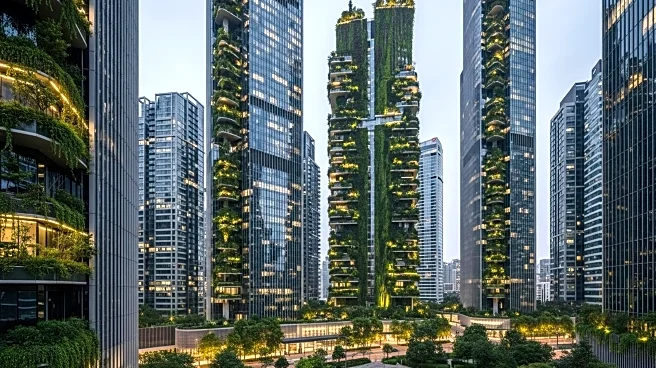What's Happening?
Smart cities are increasingly incorporating vertical gardens and urban agriculture technologies to address food security and sustainability challenges. By 2025, over 60% of smart cities are expected to integrate precision farming technologies into their urban food systems. These cities are leveraging advanced technologies such as IoT, AI, and edge computing to transition from traditional food systems to localized, sustainable frameworks. Vertical farms, rooftop gardens, and hydroponic systems are becoming more prevalent within smart city boundaries, enhancing local food production and reducing food miles. The integration of these technologies allows for real-time monitoring and management of food production, optimizing resource use and minimizing environmental impact.
Why It's Important?
The integration of vertical gardens and smart agriculture technologies in urban environments is crucial for enhancing food security and sustainability. As urban populations grow, the demand for efficient and resilient food systems increases. By utilizing IoT and AI, smart cities can optimize food production, reduce resource wastage, and minimize environmental impact. This shift supports urban sustainability goals and helps cities become more self-sufficient in food production. The adoption of these technologies also fosters innovation in urban planning and agriculture, paving the way for more sustainable and resilient cities.
What's Next?
As smart cities continue to adopt vertical gardening and precision farming technologies, further advancements in IoT and AI are expected to enhance urban agriculture. The integration of renewable energy sources into urban farms will support sustainability efforts, reducing dependency on fossil fuels. Additionally, the use of blockchain for traceability in food supply chains will increase transparency and trust among consumers and local governments. These developments will likely lead to more efficient and sustainable urban food systems, contributing to global efforts to address food security and climate change.
Beyond the Headlines
The integration of smart agriculture technologies in urban environments raises important ethical and social considerations. Ensuring equitable access to these technologies and their benefits is crucial to avoid exacerbating inequality in urban areas. Additionally, the increased use of data and sensors in agriculture poses challenges related to data privacy and security. Addressing these issues will require collaborative planning and robust policy frameworks to ensure that the benefits of smart agriculture are broadly shared and do not contribute to gentrification or environmental injustice.












